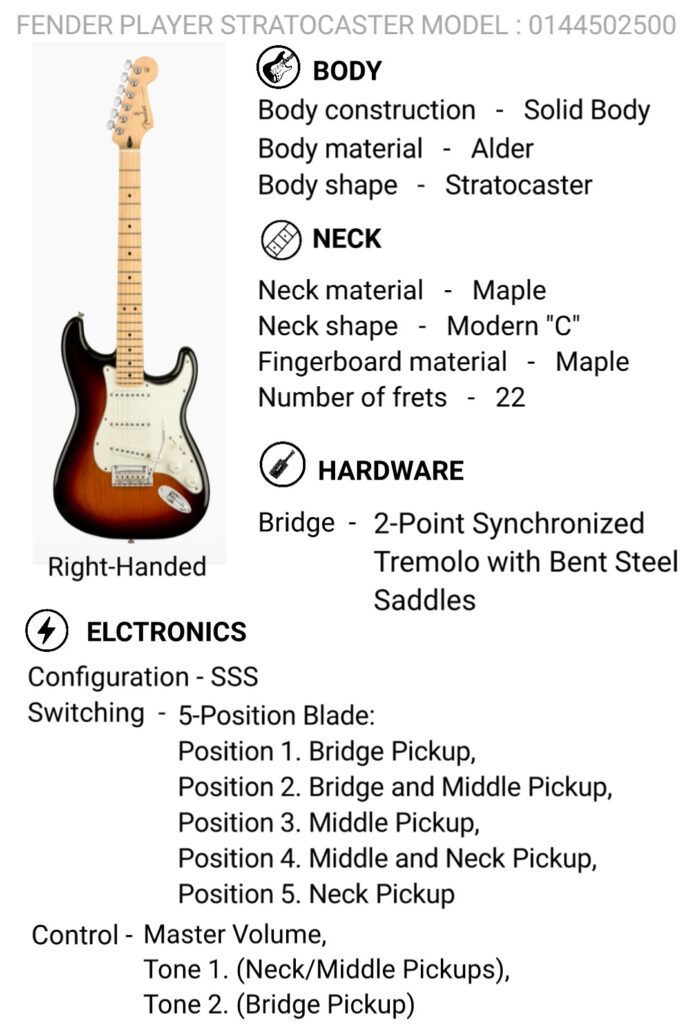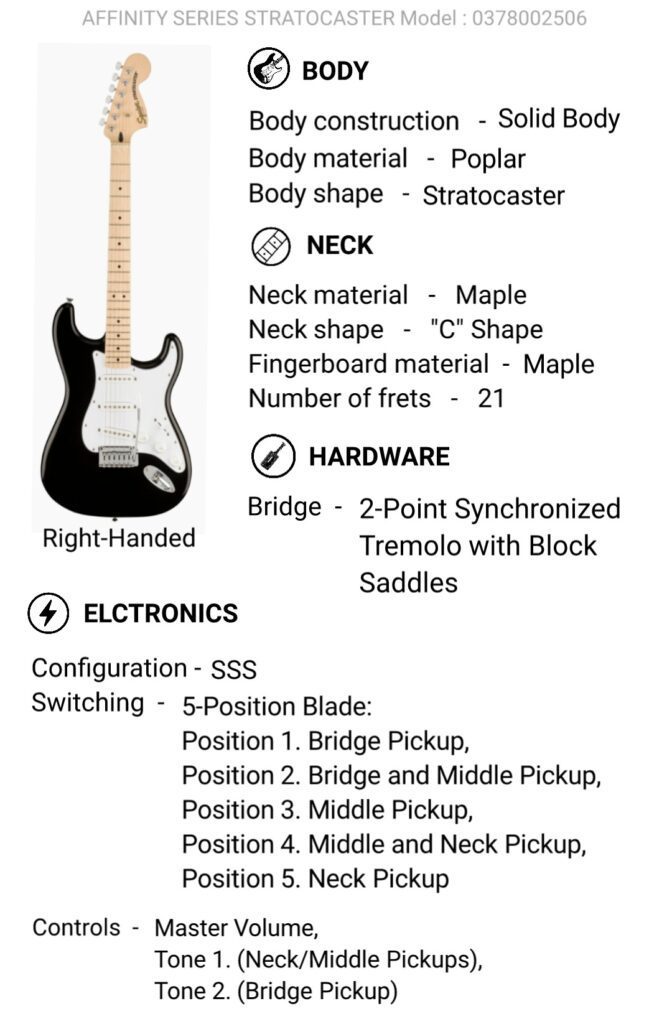List of Top 10 SSS Electric Guitars in 2024 with features and specifications, You can compare electric guitar prices on different online stores.
No: 6
Fender Player Stratocaster

Read More
 Amazon.in
Amazon.in  ₹ 78,715
₹ 78,715  Go To Store
Go To Store
 Amazon.com
Amazon.com  $ 953
$ 953  Go To Store
Go To Store
 Guitar Center
Guitar Center  $ 849
$ 849  Go To Store
Go To Store
 Guitar Center
Guitar Center  $ 849
$ 849  Go To Store
Go To Store
 Thomann
Thomann  $ 689
$ 689  Go To Store
Go To Store
 Thomann
Thomann  $ 689
$ 689  Go To Store
Go To Store
No: 8
PRS SE Silver Sky
No: 11
Fender Affinity Series Stratocaster

Introduction: The SSS (Three Single-Coils) pickup configuration is an iconic and versatile choice for electric guitars, revered for its distinctive tonal characteristics and adaptability across various musical genres. Let’s delve into the world of SSS electric guitars, exploring their history, tonal qualities, and their influence on the music landscape.
”Read_More”
For which genres of music is the SSS (Three Single-Coils) pickup configuration suitable?
The SSS (Three Single-Coils) pickup configuration is renowned for its versatility, making it suitable for a broad spectrum of music genres. The distinct tonal characteristics of single-coil pickups contribute to a bright, clear, and articulate sound, offering musicians the flexibility to explore various musical styles.
- Blues and Jazz:
- The SSS configuration excels in blues and jazz genres, delivering the clean and dynamic tones required for intricate phrasing and expressive playing.
- Rock and Classic Rock:
- Iconic in classic rock, the SSS setup provides the crispness and clarity needed for rhythmic chord progressions and searing lead lines.
- Pop and Country:
- Well-suited for pop and country music, the bright and twangy qualities of single-coil pickups lend themselves to the genre’s melodic and upbeat nature.
- Funk and R&B:
- The SSS configuration’s snappy response and defined individual note articulation make it a preferred choice for funk and R&B styles, allowing for tight, rhythmic playing.
- Reggae and World Music:
- In genres like reggae and world music, the clarity of the SSS setup contributes to the intricate picking patterns and rhythmic elements inherent in these styles.
- Surf Rock:
- The bright and shimmering tones produced by SSS pickups are iconic in surf rock, providing the requisite sparkle and clarity for this genre’s distinctive sound.
- Versatility Across Genres:
- Beyond these specific genres, the SSS configuration’s versatility shines through in its ability to adapt to various playing techniques. From clean, bell-like tones to slightly overdriven crunch, the SSS setup accommodates a wide range of playing styles.
It’s important to note that while the SSS configuration is versatile, individual preferences play a significant role in choosing the right pickup setup. Musicians seeking a well-rounded and adaptable sound for diverse musical contexts often find the SSS pickup configuration to be an excellent choice.
Tonal Characteristics:
The SSS configuration is celebrated for its bright, clear, and articulate sound. Each single-coil pickup captures the nuances of the guitar strings, producing a crisp and well-defined tone. The individual pickups contribute to a harmonic richness that is especially pronounced in clean settings, making the SSS setup ideal for intricate chord work and melodic lines.
Innovation and Signature Models:
Over the years, guitar manufacturers have continued to innovate within the SSS realm. Artists like Eric Clapton, Stevie Ray Vaughan, and Yngwie Malmsteen have collaborated with brands to create signature SSS models, showcasing the enduring popularity and versatility of this configuration.
Modern Interpretations:
Contemporary guitar makers have introduced modern twists on the SSS configuration, incorporating advanced electronics, noise-cancelling features, and additional tonal options while preserving the core essence of the setup.
Conclusion:
SSS electric guitars stand as a testament to the enduring legacy of classic design and innovation in the world of musical instruments. Whether you’re a blues virtuoso, a jazz aficionado, or a rock enthusiast, the SSS configuration invites players to explore the sonic possibilities and carve out their musical journey on a canvas rich with tradition and modernity.
How to choose right SSS electric Guitar
Choosing the right SSS (Three Single-Coils) electric guitar involves considering several factors to ensure that the instrument aligns with your playing style, preferences, and musical goals. Here’s a guide to help you make an informed decision:
- Musical Genre:
- Identify the primary genre or genres you intend to play. SSS configurations are versatile, but certain guitars may cater better to specific styles. For example, if you’re into blues, classic rock, or jazz, a Stratocaster-style SSS guitar might be an excellent choice.
- Pickup Characteristics:
- Understand the tonal characteristics of the single-coil pickups in the guitar. SSS pickups offer bright, clear tones with a crisp attack. Consider whether you prefer a warmer sound, in which case a guitar with slightly overwound or noise-canceling single-coils might be suitable.
- Neck Profile and Fretboard Material:
- Assess the neck profile and fretboard material for comfort and playability. Different guitars have varying neck shapes, such as C-shaped or modern profiles. Fretboard materials like rosewood, maple, or ebony can influence the feel and response of the guitar.
- Scale Length:
- Choose a scale length that suits your playing style. Shorter scales can offer a smoother feel, while longer scales may provide better string tension. Common scale lengths for SSS guitars are 25.5 inches (Stratocaster) and 24.75 inches (some variants).
- Bridge Type:
- Consider the bridge type based on your preferences for tremolo use and tuning stability. Options include traditional synchronized tremolos, two-point tremolos, or hardtail bridges. Choose a bridge that complements your playing style.
- Brand and Model Reputation:
- Research the reputation of the guitar brand and model. Established brands with a history of producing quality instruments include Fender, G&L, and Suhr. Explore user reviews, artist endorsements, and expert opinions to gauge the overall reputation.
- Budget:
- Determine your budget range. SSS guitars come in a wide price range, from affordable entry-level options to high-end, custom-shop models. Establish a budget that aligns with your financial considerations.
- Playability and Setup:
- Play the guitar if possible or, if buying online, ensure that the retailer provides information on the guitar’s setup. Pay attention to factors such as action, intonation, and overall playability. A well-set-up guitar enhances the playing experience.
- Personal Preferences:
- Trust your personal preferences. The look, feel, and sound of the guitar should resonate with you. Whether it’s a vintage-style Stratocaster or a modern SSS variant, choose a guitar that inspires you to play.
By carefully considering these factors, you can navigate the vast array of SSS electric guitars available and find the one that not only meets your practical needs but also sparks your creativity and musical expression.
Pros and Cons SSS electric Guitars
Pros:
- Versatility:
- SSS configurations are highly versatile, making them suitable for a wide range of musical genres. They can handle clean tones, distorted riffs, and everything in between.
- Bright and Clear Tones:
- Single-coil pickups produce bright and clear tones with a crisp attack. This quality is favored for genres where clarity and articulation are essential.
- Distinctive Clean Sound:
- SSS guitars excel in producing a distinctive and sparkling clean sound, making them ideal for genres like jazz, blues, and pop.
- Dynamic Response:
- Single-coil pickups offer a dynamic response to playing nuances, allowing for expressive playing styles and responsive interaction with the player.
- Iconic Design:
- SSS guitars, especially the Fender Stratocaster, have an iconic and timeless design that has become synonymous with the history of electric guitars.
- Individual Pickup Controls:
- SSS guitars often come with individual pickup controls, allowing players to blend the neck, middle, and bridge pickups to achieve a variety of tonal combinations.
Cons:
- Susceptibility to Hum:
- Single-coil pickups are more susceptible to picking up electromagnetic interference and producing a hum compared to humbuckers. This can be pronounced in certain playing environments.
- Limited High-Gain Performance:
- SSS configurations may not handle high-gain settings as well as guitars with humbuckers. They might be prone to unwanted noise and feedback at higher volume levels.
- Less Low-End Power:
- Single-coil pickups generally have less low-end power compared to humbuckers. This might be a consideration for players seeking a heavier or thicker tone.
- String Noise:
- The bright and clear nature of single-coil pickups can accentuate string noise, especially if the player uses a lot of sliding or bending techniques.
- Tonal Consistency:
- Achieving a completely noise-free single-coil sound can be challenging. It may require additional electronics or noise-cancelling systems to maintain tonal consistency.
- Not Ideal for Heavy Metal:
- While SSS guitars can handle a variety of genres, they may not be the first choice for players seeking the heavy and saturated tones associated with certain metal subgenres.
- Bridge Pickup Brightness:
- Some players find the bridge pickup on SSS guitars to be too bright for their liking, especially when compared to the warmer tones of the neck and middle pickups.
It’s essential to consider your playing style, musical preferences, and the genres you intend to explore when choosing between SSS and other pickup configurations. Each type of pickup has its unique strengths and considerations, and the choice ultimately depends on your individual needs as a guitarist.
History of SSS electric Guitars
The history of SSS (Three Single-Coils) electric guitars is closely tied to the iconic Fender Stratocaster, a revolutionary instrument that played a pivotal role in shaping the landscape of modern music. Here’s a brief journey through the history of SSS guitars:
Birth of the Fender Stratocaster (1954):
- Innovation by Leo Fender: The Fender Stratocaster, introduced in 1954, was the brainchild of Leo Fender, a visionary inventor and founder of Fender Musical Instruments Corporation.
- Triple Single-Coil Pickup Design: The Stratocaster was revolutionary in its design, featuring three single-coil pickups, each strategically placed at the neck, middle, and bridge positions.
Features and Design Elements:
- Contoured Body: The Stratocaster introduced a contoured body shape for enhanced player comfort, distinct from the flat-bodied guitars of its time.
- Synchronized Tremolo System: It featured a synchronized tremolo system, allowing players to modulate pitch while playing.
- Five-Way Pickup Selector Switch: The introduction of a five-way pickup selector switch provided players with a multitude of tonal options by combining the three pickups in different configurations.
Evolution and Popularity:
- Endorsements and Iconic Players: The Stratocaster gained popularity rapidly and became the go-to instrument for many influential guitarists. Artists like Jimi Hendrix, Eric Clapton, and Stevie Ray Vaughan contributed to its iconic status.
- Modifications and Customization: Over the years, players began modifying and customizing their Stratocasters to suit their preferences, leading to various iterations and signature models.
Continued Innovation:
- Modern Variations: The success of the Stratocaster inspired other guitar manufacturers to produce SSS configurations. Today, numerous brands offer their take on the classic design.
- Technological Advances: Advancements in pickup technology, materials, and manufacturing processes have led to modern SSS guitars that retain the essence of the original design while incorporating contemporary features.
Legacy:
- Cultural Impact: The Fender Stratocaster’s cultural impact extends beyond its contribution to music. Its design, sound, and playability have made it an enduring symbol in popular culture.
- Standard for Versatility: SSS guitars, particularly the Stratocaster, have become synonymous with versatility, capable of producing a wide range of tones suitable for various genres.
In summary, the history of SSS electric guitars is inseparable from the Fender Stratocaster’s innovation, which not only transformed the guitar industry but also left an indelible mark on the world of music. The enduring popularity and evolution of SSS configurations continue to shape the preferences of guitarists across generations.
”Read_Less”

